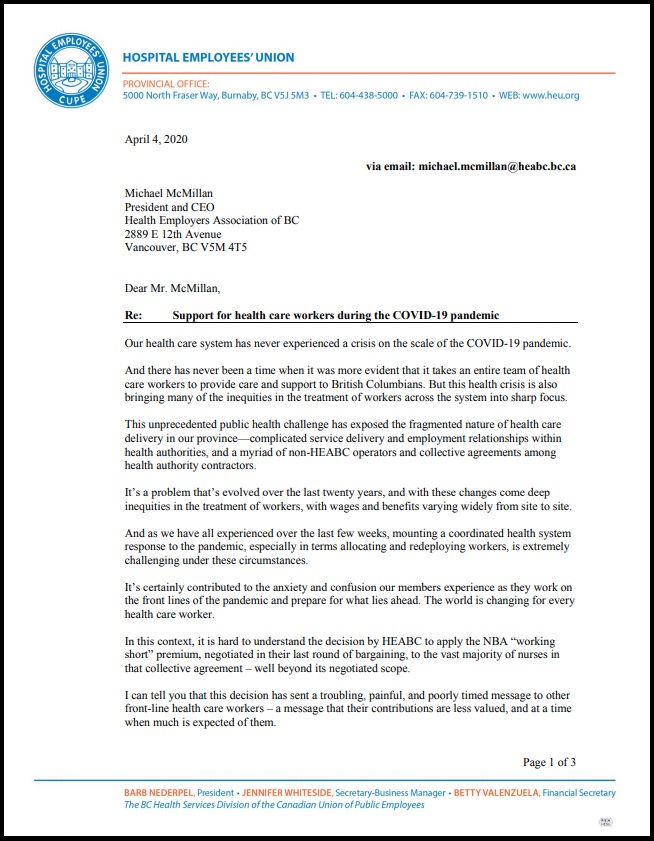The Hospital Employees' Union wrote the following letter to B.C.'s health employers in response to their decision last week to provide most nurses covered by the NBA agreement with a "working short" premium. Learn more about this from our newsletter of April 1: HEU calls for safe work and fair pay
April 4, 2020
Michael McMillan
President and CEO
Health Employers Association of BC
2889 E 12th Avenue Vancouver, BC V5M 4T5
Dear Mr. McMillan,
Re: Support for health care workers during the COVID-19 pandemic
Our health care system has never experienced a crisis on the scale of the COVID-19 pandemic. And there has never been a time when it was more evident that it takes an entire team of health care workers to provide care and support to British Columbians. But this health crisis is also bringing many of the inequities in the treatment of workers across the system into sharp focus.
 This unprecedented public health challenge has exposed the fragmented nature of health care delivery in our province—complicated service delivery and employment relationships within health authorities, and a myriad of non-HEABC operators and collective agreements among health authority contractors.
This unprecedented public health challenge has exposed the fragmented nature of health care delivery in our province—complicated service delivery and employment relationships within health authorities, and a myriad of non-HEABC operators and collective agreements among health authority contractors.
It’s a problem that’s evolved over the last twenty years, and with these changes come deep inequities in the treatment of workers, with wages and benefits varying widely from site to site.
And as we have all experienced over the last few weeks, mounting a coordinated health system response to the pandemic, especially in terms allocating and redeploying workers, is extremely challenging under these circumstances.
It’s certainly contributed to the anxiety and confusion our members experience as they work on the front lines of the pandemic and prepare for what lies ahead. The world is changing for every health care worker.
In this context, it is hard to understand the decision by HEABC to apply the NBA “working short” premium, negotiated in their last round of bargaining, to the vast majority of nurses in that collective agreement – well beyond its negotiated scope. I can tell you that this decision has sent a troubling, painful, and poorly timed message to other front-line health care workers – a message that their contributions are less valued, and at a time when much is expected of them.
This comes at a time of rising fear and anxiety throughout the workforce, exacerbated by increased costs and challenges associated with being an essential worker.
Workers are afraid of being exposed to the virus at work or bringing it home to their families.
They face long hours at work only to face empty shelves at the grocery store at the end of their shift.
They often can’t leave their unit or work area to get food on their breaks, or can’t bring food to work because there’s nowhere to store it.
They’re told to bring a change of clothes to work and take their work clothes home in a sealed bag to launder. But in many cases the laundry facility in their apartment building has been closed for public health reasons and there is no open laundromat in their neighborhood.
Transportation has become more challenging and many have had to make alternate arrangements to get to work, or will face additional transportation costs when single site orders come into place.
Workers may also need to find alternate shelter, and make alternate child and elder care arrangements.
HEU members understand that they are critical to helping patients, residents and other workers stay safe in this crisis. They are showing great resilience in the face of this pandemic.
But many of these workers have had their wages, benefits, and working conditions decimated over the years of privatization, contracting out and rollbacks. The irony that they are suddenly critical to the effort to fight COVID-19 isn’t lost on them – nor is HEABC’s decision to target a broad benefit solely to nurses.
There are several ways in which health employers and government can provide material support to the workers who are getting us through this crisis:
- Provide enhanced meal allowances, such as those in the FBA collective agreement, and provide them on every shift to every worker.
- Provide or increase uniform allowances so that workers can buy shoes and clothes. Provide meals for workers who can’t leave their units during their shift.
- Address transportation costs for workers who need to travel further or take taxis.
- Implement a “Health Care Worker COVID-19 Pandemic Support Allowance” which would support workers in addressing their particular needs.
We believe that employers and government must provide supports to frontline-workers fighting this pandemic. Such supports need to be extended to all workers across health and community agencies, regardless of employer. One necessary step is levelling up sick leave provisions.
There are other inequities that must be addressed. Hospital housekeepers are key to keeping our facilities virus free. Yet in our major hospitals they are paid less today than they were during the SARS crisis 17 years ago – the result of privatization. Dietary workers are similarly paid substandard wages that are not sustainable.
It’s encouraging that health authorities and other health employers have embraced the nightly 7 p.m. shout out to health care workers. But frankly, their thanks are not enough. And the morale of the workforce is in danger of diminishing right at the time when we need them to feel that employers have their backs.
Employers and government are asking a lot of health care and social services workers during this crisis. We’re asking that they be treated fairly.
I look forward to the opportunity to discuss our proposed options.
Sincerely,
Jennifer Whiteside
Secretary-Business Manager
HOSPITAL EMPLOYEES' UNION